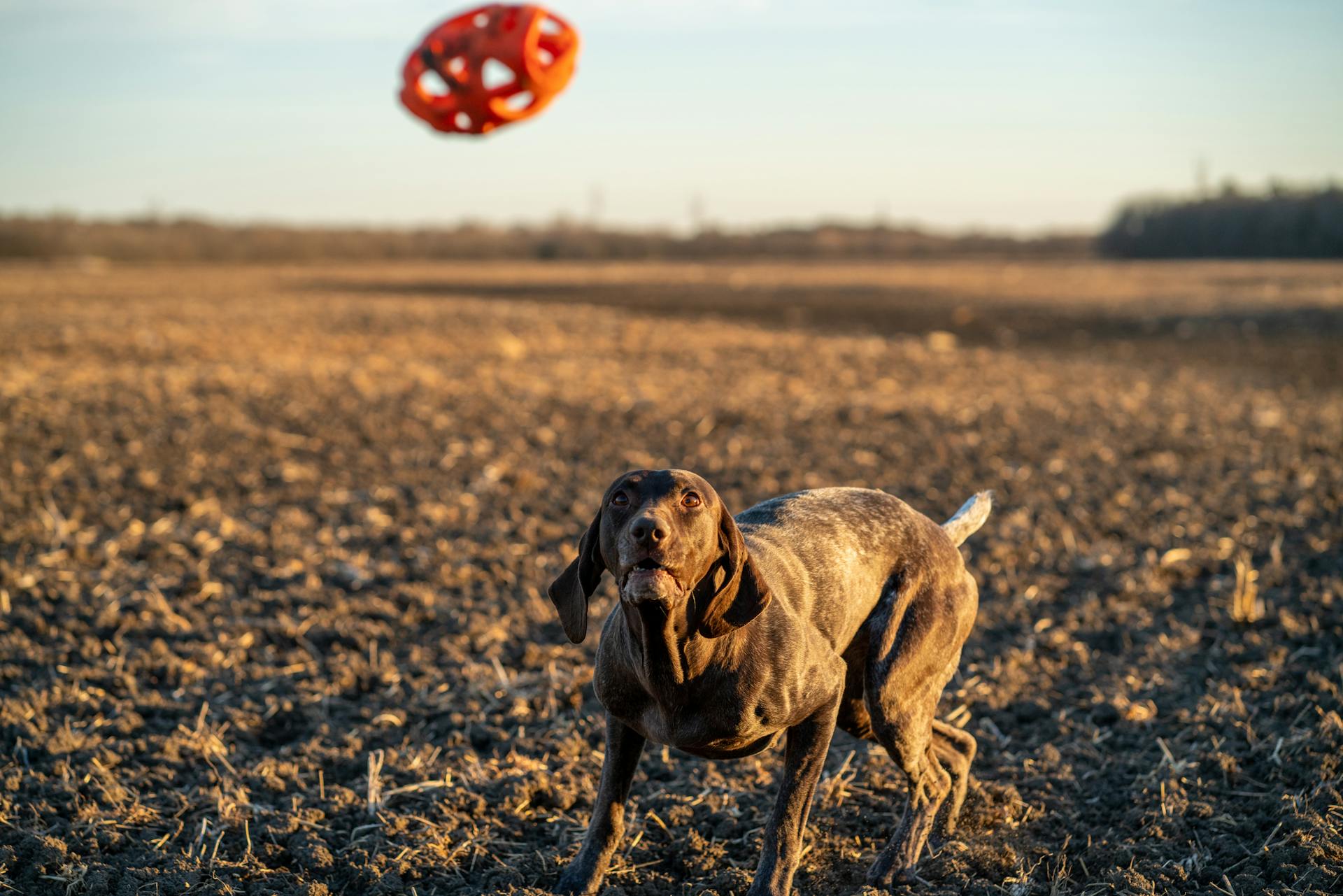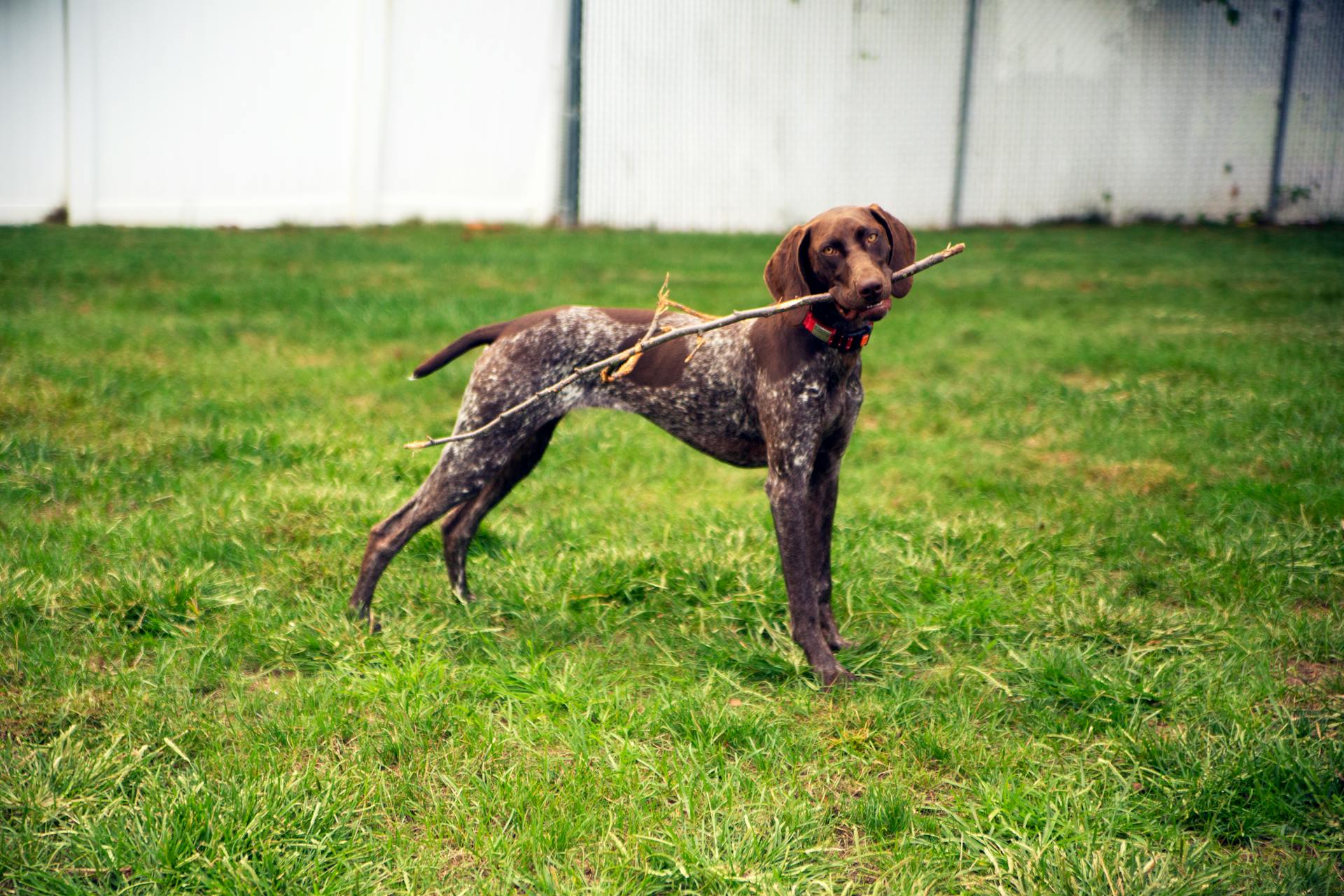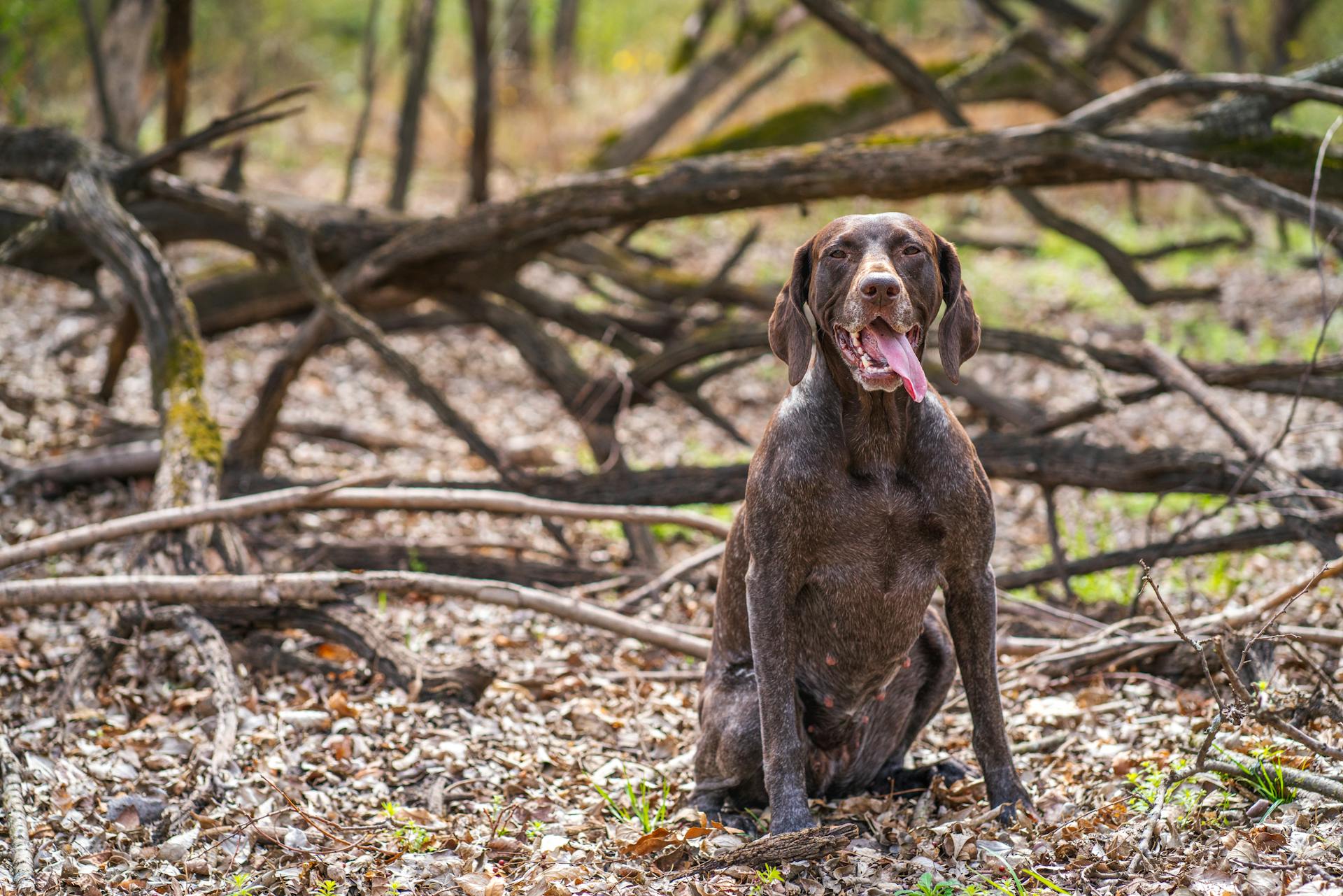
The German Wirehaired Pointer is a versatile hunting breed that excels in various terrains and conditions. They were originally bred to hunt a variety of game, from small birds to large deer.
Their thick, wiry coat and water-resistant properties make them ideal for hunting in wet and muddy environments. This breed's ability to adapt to different situations is a testament to their intelligence and athleticism.
German Wirehaired Pointers are known for their keen sense of smell and strong instinct to follow a scent trail. This trait allows them to track game with ease, making them a valuable asset in the hunting field.
Broaden your view: Game Bred American Pit Bull Terrier
Dog Care
German Wirehaired Pointers are high-energy dogs that need lots of exercise and mental stimulation to be happy. They love to be outside in nature and thrive in organized competitions like agility, obedience, and hunting trials.
Daily long walks and longer hikes on weekends are a must for these sporting dogs. The German Wirehaired Pointer Club of America recommends this level of exercise to keep them happy and healthy.
Related reading: How Much Exercise Do Labrador Retrievers Need
German Wirehaired Pointers can grow to be 22–26 inches tall and weigh 50–70 pounds, making them a medium-sized breed. They have a coat that's relatively coarse and can be shorter in puppies.
To keep your GWP happy, you need to spend lots of time outdoors with them. They love human companionship and interaction, and can adapt to living indoors but still require daily exercise.
These dogs were bred for all-day hunting in the field, so they have a strong instinct to engage in physical activity. In the absence of hunting, they still need substantial daily exercise to fulfill their physical needs.
To keep them safe, it's essential to confine them within a secure area with a fence that's at least six feet high and resistant to digging or escaping. A covered dog run can be an ideal outdoor shelter option for them.
Regular veterinary check-ups and a healthy lifestyle can help maintain your GWP's overall well-being. Be aware of potential health issues like hip dysplasia, cataracts, and other hereditary conditions that can affect the breed.
German Wirehaired Pointers are generally healthy dogs that live an average of 12-14 years. Pet insurance might be a good investment for your GWP puppy to cover potential health issues.
Behavior and Training
German Wirehaired Pointers can be anxious if left alone for long periods, so crate training from an early age is essential to decrease separation anxiety.
They thrive on constant companionship and exercise, so if you're not an outdoorsy person, this breed might not be the best fit.
German Wirehaired Pointers need patient training grounded in positive reinforcement, and forming a close bond with your dog is key to training them.
They have a robust energy, strength, and intelligence, making them ready for adventure, but they also require a job, even if it's just fetching your slippers in the morning.
A German Wirehaired Pointer's high prey drive means they might not live well with cats or other small animals, so it's essential to supervise interactions between dogs and kids.
Early socialization is crucial for this breed, as it is for any other, and using a firm "No" rather than harsh treatment will yield positive results in training and obedience.
With their watchful nature, German Wirehaired Pointers serve as reliable watchdogs, alerting with barks when unfamiliar individuals approach their territory.
German Wirehaired Pointers are strong dogs, weighing up to 70 lbs and standing 25 inches tall at their shoulders, with wire-like fur and a bearded facial fringe.
On a similar theme: Why Are Labradors so Popular
Grooming Guide
German Wirehaired Pointers have a unique coat that requires special care. Their double coat helps keep them warm and protects them from hazards, but it needs to be stripped twice a year to maintain its wiry texture.
Regular brushing is essential to keep their coat clean and manage shedding, which is light year-round. They rarely need a bath, but when they do, use a shampoo made for wire-coated breeds to preserve the texture.
The German Wirehaired Pointer Club of America recommends regular nail trimming to maintain good nail health and prevent injuries. If you can hear their nails clicking on the floor, they are too long.
Their ears need to be checked regularly for redness, odor, or signs of infection. Use a cotton ball dampened with a gentle, pH-balanced ear cleaner to clean the outer ear and prevent infections.
Regular dental hygiene is crucial to prevent tartar buildup, gum disease, and bad breath. Brush their teeth at least two or three times a week to keep them healthy.
Early grooming experiences should be positive and rewarding for the German Wirehair, starting from a young age. Gradually accustom them to being brushed, examined, and having their paws handled to establish a foundation for easier veterinary exams and other necessary handling as adults.
History
The German Wirehaired Pointer has a rich history that spans over a century. Developed by German hunters in the late 1800s, this breed was created to be a robust dog capable of hunting various game on any type of terrain.
The breed was developed by combining the finest qualities of the Pointer, Poodle, and Foxhound. This resulted in an all-purpose dog with exceptional pointing and retrieving abilities, both on land and in water, regardless of weather conditions or environmental challenges.
The German Wirehaired Pointer was officially recognized and admitted into the German Kartell for dogs in 1928. This recognition marked a significant milestone in the breed's history.
In the 1920s, the breed was introduced to the United States, where it quickly gained popularity among hunters. The breed's popularity grew, but the American-bred German Wirehaired Pointers started to diverge from the original traits of the Deutsch Drahthaar.
A breed club was formed in the United States to promote the breed and maintain its original characteristics. The VDD-GNA, a stateside chapter of the German parent club, was formed in 1971 to produce and maintain Deutsch Drahthaars in the United States under the authority of the German breed club.
The German Wirehaired Pointer is still cherished as a beloved hunting companion today, with many hunters appreciating its versatility and exceptional hunting abilities.
You might enjoy: Shiba Inu in Usa
Characteristics and Traits
The German Wirehaired Pointer is a breed that's built for action, with a wiry and functional coat that safeguards them against harsh weather conditions and dense underbrush.
Their keen sense of smell enables them to track and point with precision, making them exceptional hunting companions. They're also highly intelligent and trainable, quick to learn new commands and tasks.
These dogs have a high level of energy and require regular exercise and physical activity, making them excellent jogging partners and companions for active individuals and families. They thrive on attention and mental stimulation, excelling in dog sports like obedience, tracking, agility, and rally.
Personality
The German Wirehaired Pointer is an affectionate and loyal companion to his family. They form strong bonds with everyone, but may have a particular person as a favorite. Beyond being a skilled hunting dog, they deeply enjoy human companionship and thrive as a valued member of the household, provided they receive ample physical and mental exercise.

German Wirehaired Pointers are generally good with children, but all interactions between dogs and kids should be supervised. They have a high prey drive due to their history as hunters, so they might not live well with cats or other small animals.
They can be reserved and aloof with strangers, but early socialization is essential for this breed, as it is for any other. When training, it's more effective to use a firm "No" rather than resorting to harsh or rough treatment. Respecting their intelligence and working with their strong desire to please will yield positive results in training and obedience.
Here are some key personality traits of German Wirehaired Pointers:
- Affectionate and loyal
- Friendly towards familiar individuals
- Reserved and aloof with strangers
- Strong bond with family members
- High prey drive
- Quick to learn new commands and tasks
- Eager to please
- Intelligent and trainable
These traits make them an excellent choice for active families or individuals who can provide them with the physical and mental stimulation they need to thrive.
Size
Size is a notable characteristic of hunting dogs, with the "Deutsch drahthaar" from the series "Hunting Dogs" measuring 17.8 to 25.6 inches in height.

German Wirehaired Pointers are generally larger, with males reaching a shoulder height of 24 to 26 inches.
Females are slightly smaller, but still measure at least 22 inches in height, making them a compact yet capable breed.
In terms of weight, you can expect a German Wirehair to weigh between 60 and 70 pounds, making them a sturdy companion for outdoor activities.
Dog Nutrition
German Wirehaired Pointers require a well-balanced diet to maintain their energy levels and overall health.
Their food should meet the nutritional standards set by the Association of American Feed Control Officials (AAFCO) and be formulated for their current life stage. Your veterinarian can advise on the best food for your dog.
Adult German Wirehaired Pointers should be fed twice a day, at breakfast and dinner, while puppies need to be fed more often, three or four times a day on a regular schedule.
To determine the right amount of food for your dog, start by checking the packaging for feeding guidelines based on their weight. However, the best way to know how much to feed your dog is by talking to your vet.
Intriguing read: Best Time to Breed Dog in Heat
As long as your dog eats a well-balanced diet approved by the AAFCO, they won’t need supplements. Your vet may recommend supplements based on your dog’s health needs, but only after consulting with them.
A highly active German Wirehaired Pointer will likely require more food compared to a less active dog. The quality of the dog food you choose also plays a role, as higher-quality food provides better nourishment, requiring smaller quantities to meet your dog’s nutritional needs.
To maintain your German Wirehair’s optimal body condition, it's recommended to measure their food and provide two meals a day instead of free-feeding.
Frequently Asked Questions
Do German wirehaired pointers retrieve ducks?
German wirehaired pointers are capable retrievers, and their strong sense of smell can help track and retrieve wounded ducks. With their keen tracking abilities, they can be a valuable asset for waterfowl hunting.
Is a pointer a good hunting dog?
Yes, Pointers are well-suited for hunting due to their strong instinct and energetic nature. They excel at locating birds and can run fast to do so, making them a popular choice for hunters.
Sources
- https://siurhaart.com/collections/dd-gwp
- https://www.petmd.com/dog/breeds/german-wirehaired-pointer
- https://projectupland.com/hunting-dogs/the-difference-between-a-deutsch-drahthaar-and-a-german-wirehaired-pointer-2/
- https://dogtime.com/dog-breeds/german-wirehaired-pointer
- https://biologydictionary.net/german-wirehaired-pointer/
Featured Images: pexels.com


